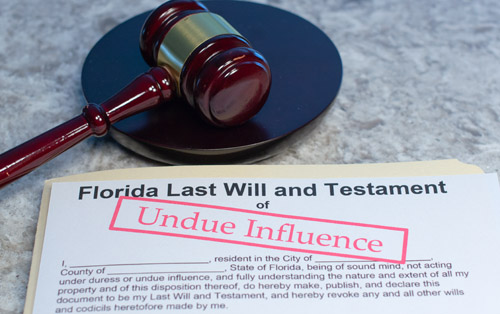One of the most important things that an estate planning attorney can do is help to ensure your will is valid. If your will isn’t valid, probate may have to step in and oversee how your assets are distributed. This means that your final wishes may not be honored. Every state has its own laws when it comes to wills and what makes them valid or invalid. Read along as an estate planning attorney helps you to understand what factors can invalidate a will in Florida.
The Will Not Being Written
In some states, you are allowed to create a verbal will. You may be able to tell someone about your final wishes, or you may even be able to record yourself with a camera or voice recorder detailing what your final wishes are. However, in the state of Florida, a will must be written in order for it to be legal and binding. If you record your will, it can be invalidated.
A Will For an Individual Under the Age of 18
In the state of Florida, wills are not legal unless the person creating the will, also known as the testator, is over the age of 18 as of the day the will is created. The one exception to this rule is if an individual is emancipated from their parents. If a party is under the age of 18 and wants to create a will, they can do so as long as the will is created after the day they are legally emancipated. If a testator is not legally emancipated or over the age of 18 as of the day the will is signed, it isn’t valid.
The Will Not Being Signed By the Party Drafting the Will
In order for a will to be valid in Florida, the will must be signed by the testator, or the individual the will is being created for. In some cases, a testator is unable to sign the will themselves. If they are unable to do so, the testator can have someone else sign the will, as long as the testator states that this person is in charge of signing the will and does so in their presence. Many legal professionals recommend this part be recorded to ensure it holds up in court.
No Witness Signatures on the Will
In addition to the testator signing the will, two other witnesses must sign the will. They must attest to the fact that the will was created by the testator or their representative and that the testator, or a party they appointed, signed the will. They must also state that the testator signed on their own free will and that they were not under duress.
The Testator Not Being of Sound Mind When the Will Was Created
Lastly, a will in Florida can be invalidated if a testator is not of sound mind when the will was created. This can be tricky, but an estate planning attorney can work with you if you have questions about a sound state of mind, including what it means and how the courts can tell if someone is or isn’t of sound mind when the will is signed.
When you create a will, you expect it to hold up in court or expect it to stand up if you have anyone who contests the will. But, if you prepared the will on your own and didn’t follow the appropriate laws, your will may be deemed to be invalid. This can happen if your will isn’t written, the testator is under the age of 18, the will wasn’t signed by the appropriate parties or the testator wasn’t of sound mind when the will was created. If you’re creating a will, hiring an estate planning attorney in Florida is the best way to ensure the will is legal and binding.





